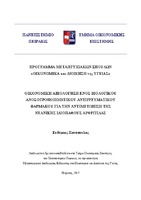Οικονομική αξιολόγηση ενός βιολογικού ανοσοτροποποιητικού αντιρρευματικού φαρμάκου για την αντιμετώπιση της Νεανικής Ιδιοπαθούς Αρθρίτιδας
Economic evaluation of a biological disease-modifying antirheumatic drug for treating Juvenile Idiopathic Arthritis

Προβολή/
Θεματική επικεφαλίδα
Ιατρική περίθαλψη, Κόστος τηςΛέξεις κλειδιά
Υγεία ; Ρευματικές παθήσεις ; ΦάρμακαΠερίληψη
Η Νεανική Ιδιοπαθής Αρθρίτιδα (εφεξής καλούμενη ΝΙΑ) είναι το πιο κοινό ρευματικό
νόσημα που εμφανίζεται σε παιδιά, ηλικίας, κυρίως κάτω των 16 ετών και παραμένει για
διάστημα μεγαλύτερο των 6 εβδομάδων, ενώ μπορεί να εξελιχθεί σε αιτία λειτουργικής
μειονεκτικότητας.
Η ασθένεια είναι αγνώστου αιτιολογίας, χαρακτηρίζεται από πόνο στις αρθρώσεις,
οίδημα και περιορισμό της κίνησης, συμπτώματα που προκαλούνται από τη φλεγμονή
του αρθρικού υμένα της προσβληθήσας άρθρωσης. Η ΝΙΑ διακρίνεται σε 7
υποκατηγορίες βάσει των κλινικών χαρακτηριστικών τις νόσου που διαρκούν για
διάστημα μεγαλύτερο των έξι μηνών – ολιγοαρθρίτιδα, πολυαρθρίτιδα οροθετική ή
οροαρνητική, ψωριασική αρθρίτιδα, συστηματική αρθρίτιδα, αρθρίτιδα σχετιζόμενη με
ενθεσίτιδα και αταξινόμητη αρθρίτιδα.
Η θεραπευτική αντιμετώπιση των παιδιών με ΝΙΑ βασιζόταν στα μη στεροειδή
αντιφλεγμονώδη, με την προσθήκη χορήγησης κορτικοστεροειδών. Αργότερα,
χρησιμοποιήθηκε η μεθοτρεξάτη, που είναι το πιο κοινό συμβατικό μη-βιολογικό
αντιρρευματικό φάρμακο, ενώ η τρέχουσα προτιμώμενη θεραπεία κάνει χρήση των
βιολογικών ανοσοτροποποιητικών φαρμάκων.
Ο σκοπός αυτής της αξιολόγησης τεχνολογιών υγείας είναι η εκτίμηση του κόστους-
αποτελεσματικότητας της θεραπευτικής αντιμετώπισης της ΝΙΑ με την χορήγηση
ανταλιμουμάμπης, ενός βιολογικού ανασοτροποποιητικού αντιρρευματικού φαρμάκου
(Humira®, AbbVie) σε συνδυασμό με τη μεθοτρεξάτη, συγκριτικά με τη συμβατική
θεραπεία με μεθοτρεξάτη.
Οι ασθενείς που έλαβαν βιολογική θεραπεία με ανταλιμουμάμπη εμφάνισαν
λιγότερες εξάρσεις της νόσου καθώς και λιγότερες ανεπιθύμητες ενέργειες από εκείνους
τους ασθενείς στους οποίους χορηγήθηκε μόνο μεθοτρεξάτη. Ωστόσο, δεν υπάρχουν
επαρκεί στοιχεία για την κλινική αποτελεσματικότητα των βιολογικών φαρμάκων σε
συγκεκριμένες υποκατηγορίες της ασθένειας.
Βάση του ανεξάρτητου μοντέλου που αναπτύχθηκε για τους σκοπούς της παρούσης
αξιολόγησης, o δείκτης πρόσθετου κόστους-αποτελεσματικότητας (ICER) για τη
θεραπεία με ανταλιμουμάμπη σε σύγκριση με τη συμβατική θεραπεία με μεθοτρεξάτη
εκτιμάται σε 25.659 ευρώ ανά κερδισμένο ποιοτικά σταθμισμένο έτος ζωής (QALY).
Τα αποτελέσματα του μοντέλου είναι πιο ευαίσθητα στις αλλαγές στις τιμές
χρησιμότητας HRQoL. Οι αλλαγές στις παραμέτρους κλινικής αποτελεσματικότητας,
όπως η διακοπή της θεραπείας και η έξαρση της νόσου, είχαν ελάχιστη επίδραση στα
αποτελέσματα του μοντέλου.


